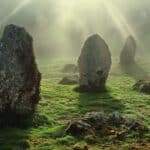Table of Contents
The Israelites cross the Jordan River through a miraculous intervention of God with the Arc of the Covenant and are circumcised at Gibeath-Haaraloth (translated as hill of foreskins), renamed Gilgal in memory.
Gilgal sounds like Gallothi, “I have removed”, but is more likely to translate as “circle of standing stones“.
The conquest begins with the battle of Jericho, followed by Ai (central Canaan), after which Joshua builds an altar to Yahweh at Mount Ebal in northern Canaan and renews the Covenant in a ceremony with elements of a divine land-grant ceremony, similar to ceremonies known from Mesopotamia.
In the Books of Kings, “Gilgal” is mentioned as the home of a company of prophets. The text states that Elijah and Elisha came from Gilgal to Bethel, and then onward to Jericho and to the Jordan, suggesting that the place was in the vicinity of Bethel, and far from Joshua’s Gilgal near Jericho.

Gilgal – Circle of standing stones
Since “Gilgal” means a “circle of standing stones”, it is quite plausible for there to have been more than one place named Gilgal, and although there are dissenting opinions, it is commonly held to be a different place from the one involved with Joshua; it has been identified with the village Jaljulia, about 11 kilometres (6.8 mi) north of Bethel.
Significantly, the Books of Kings treat it as a place of holiness, suggesting that stone circles still had a positive religious value at the time the source text of the passages in question was written, rather than having been condemned as heathen by religious reforms. Another opinion is that it is not different from the Book of Joshua, as it is located it near Bethel as does the Books of Chronicles.
The term gilgal is thought by modern archaeologists to refer to a type of structure, which may then receive additional names, for example “the gilgal by the terebinths of Moreh” (Deuteronomy 11:30) or “the gilgal on the eastern border of Jericho” (Joshua 4:19). Gilgal structures have been found only in the Jordan River valley, and in the Samarian mountains on the edge of the desert.
As you know, these mountains are across the Jordan, westward, toward the setting sun, near the great trees of Moreh, in the territory of those Canaanites living in the Arabah in the vicinity of Gilgal.
Deuteronomy 11:30
It was not your children who saw what he did for you in the wilderness until you arrived at this place, and what he did to Dathan and Abiram, sons of Eliab the Reubenite, when the earth opened its mouth right in the middle of all Israel and swallowed them up with their households, their tents and every living thing that belonged to them. But it was your own eyes that saw all these great things the Lord has done.
Deuteronomy 11
